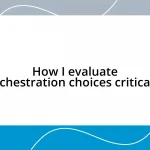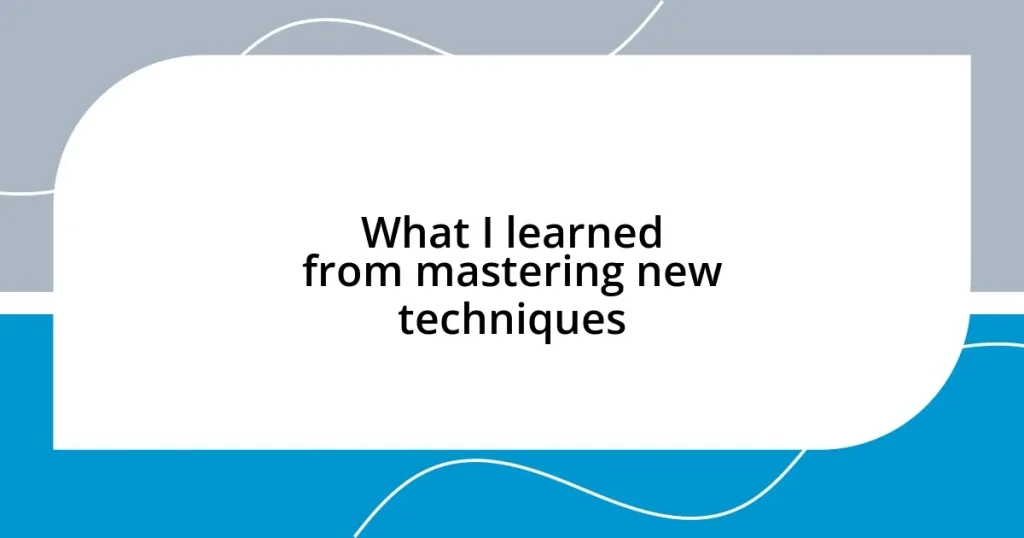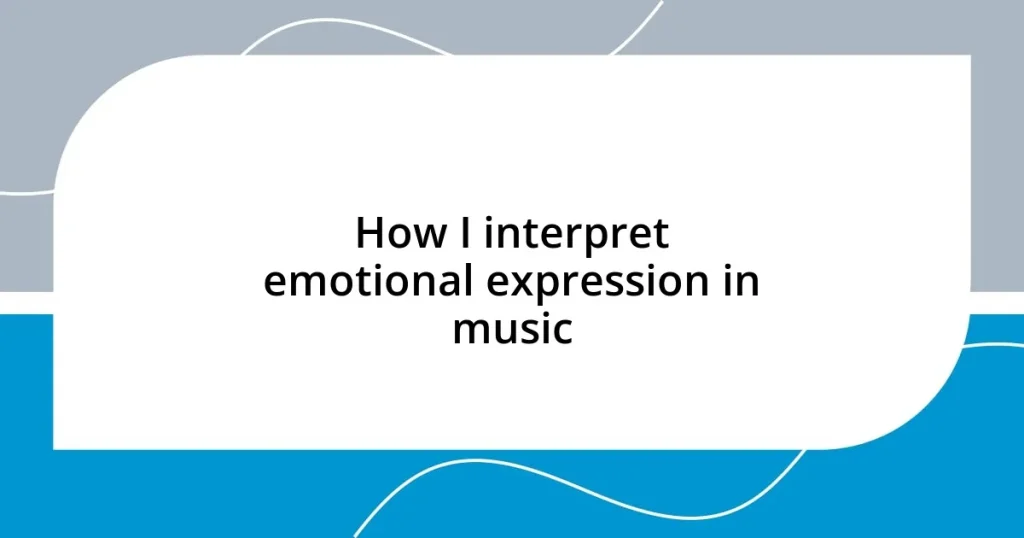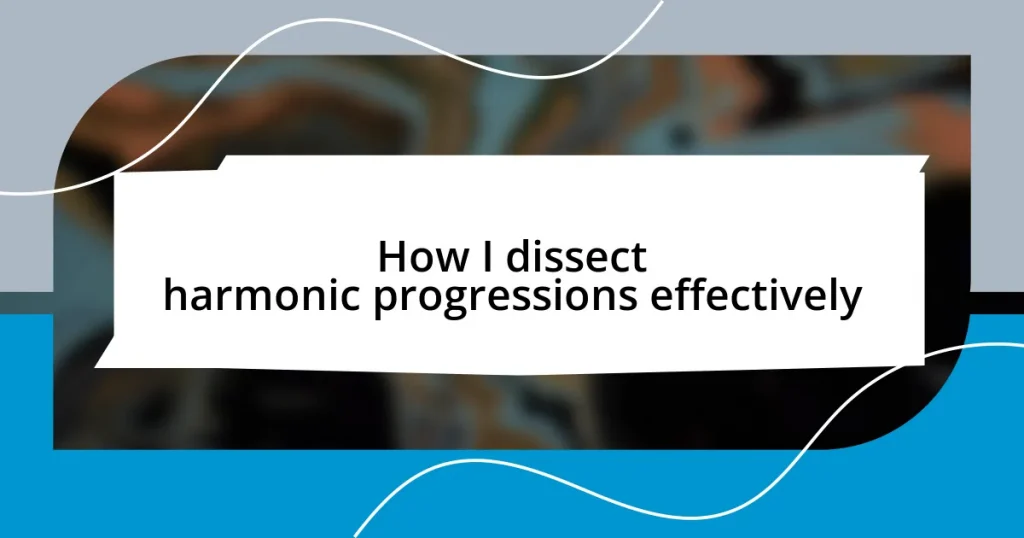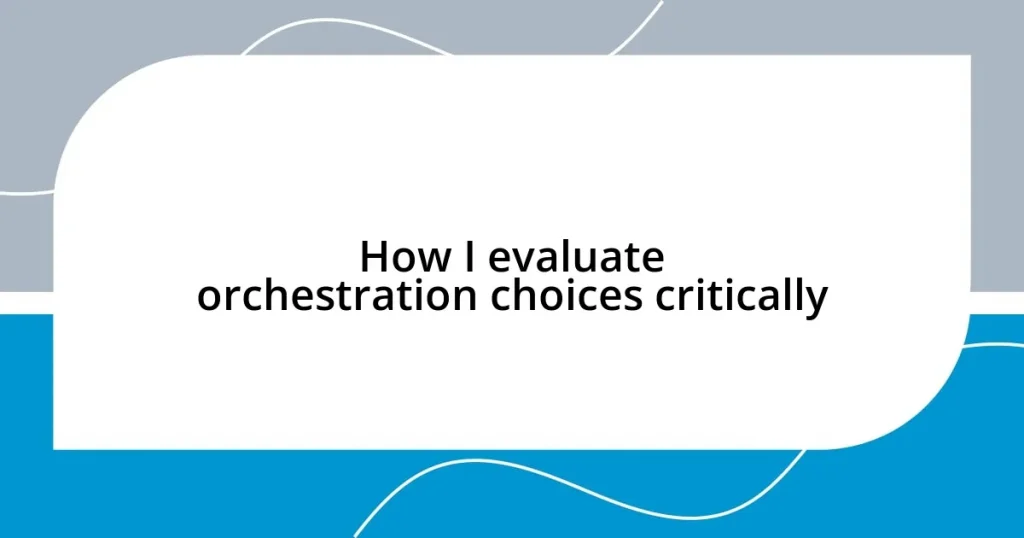Key takeaways:
- Mastery of new techniques involves persistence and resilience, with obstacles serving as valuable lessons.
- Continuous learning is essential for personal and professional growth, enhancing adaptability and self-awareness.
- Selecting techniques wisely, based on personal goals and genuine interest, prevents overwhelm and promotes purposeful learning.
- Real-life application of new skills may require experimentation and adaptation, underscoring the importance of patience and flexibility.
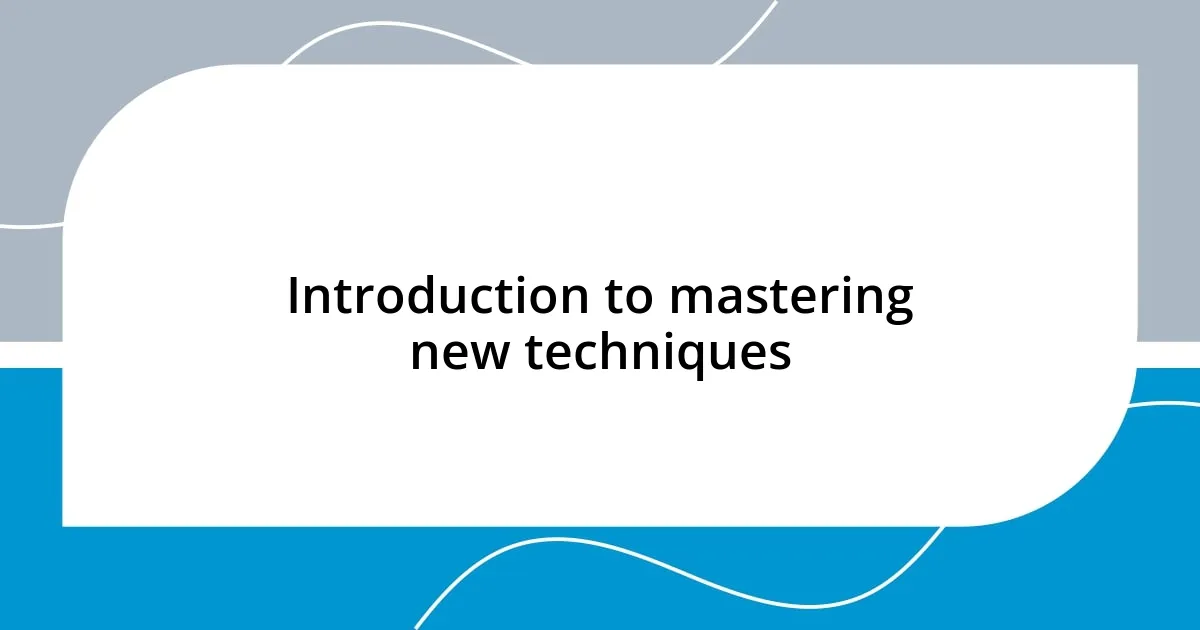
Introduction to mastering new techniques
Mastering new techniques is a journey that can feel both thrilling and intimidating. I remember when I first attempted to learn a complex software program for my job; it felt like learning a new language. Have you ever found yourself overwhelmed by something seemingly insurmountable? It’s a shared experience, and it’s often in those moments of struggle that the deepest lessons are learned.
As I immersed myself in these new skills, I discovered that mastery is less about perfection and more about persistence. There were days when I would hit roadblocks, frustrating me to no end—yet, those very hurdles taught me resilience. Isn’t it fascinating how obstacles can become our best teachers? Embracing the process of learning incorporates not just the technical know-how but also emotional growth.
Through trial and error, I learned to appreciate each small victory along the way. I recall the excitement of finally grasping a previously challenging concept and how it reignited my enthusiasm for learning. Have you ever experienced that spark of confidence? It’s moments like these that not only propel us forward but also reshape our understanding of what we can achieve, reminding us that every new technique adds a brushstroke to the canvas of our skills.
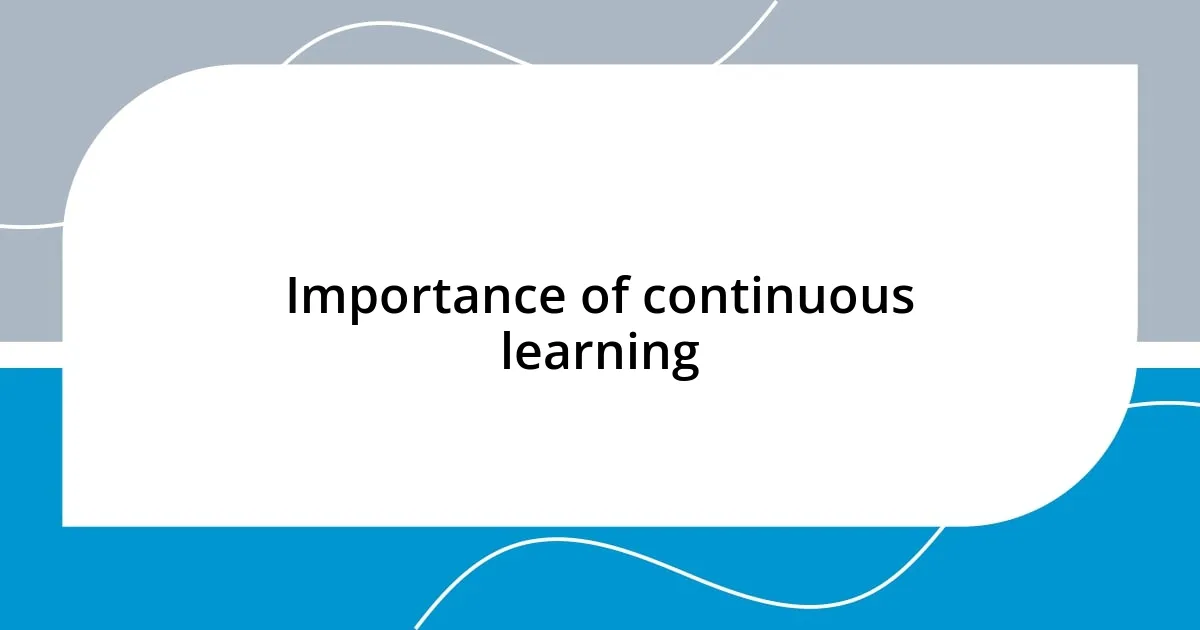
Importance of continuous learning
Continuous learning serves as the backbone of personal and professional growth. I once found myself stuck in a routine, relying on the same techniques for years. The moment I decided to embrace new methods, I realized how invigorating it is to expose myself to fresh ideas and perspectives. It’s as if a window opened, allowing a breeze of inspiration to sweep through my stale environment.
Learning is not just about acquiring knowledge; it’s about adapting to change. I vividly recall the shift I felt when I updated my skill set to stay relevant in my field. The initial anxiety transformed into a sense of empowerment that motivated me to explore even more. How many times have you hesitated before diving into a new subject? I can assure you that pushing through that hesitation often leads to remarkable discoveries, both about the subject and about ourselves.
The benefits of continuous learning extend far beyond technical skills. I remember how learning to code, initially a daunting task, ultimately enriched my problem-solving abilities. I gleaned insights into my working style and discovered new passions along the way. Isn’t it exciting how one endeavor can ripple into so many areas of life? By committing to ongoing education, we don’t just become better at our jobs; we become more well-rounded individuals.
| Aspect | Continuous Learning |
|---|---|
| Adaptability | Fosters resilience in a changing world |
| Personal Growth | Enhances self-awareness and self-confidence |
| Skill Development | Equips with relevant and updated knowledge |
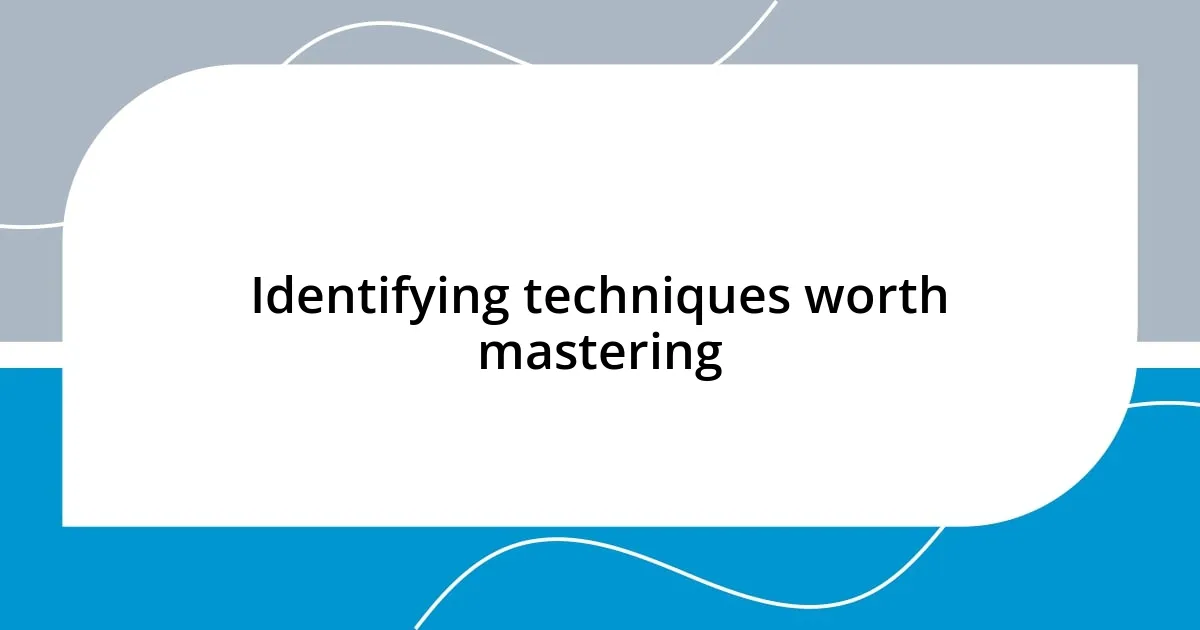
Identifying techniques worth mastering
Identifying techniques worth mastering requires a blend of curiosity and practicality. I’ve learned that not every shiny new technique is worth my time. For instance, when I first stumbled upon an advanced analytics tool, I was tempted to dive in headfirst. Yet, after a bit of reflection, I realized I needed to assess its relevance to my goals and current skill set. This kind of mindful selection saves me from feeling overwhelmed and helps root my learning in purpose.
To make the selection process easier, I often ask myself a few guiding questions:
– Does this technique align with my personal or professional objectives?
– Will mastering it enhance my current skill set or open new opportunities?
– How does it integrate with what I already know?
– Can I see a practical application for this technique in my daily tasks or projects?
– Am I genuinely interested in learning it, or am I succumbing to external pressure?
Understanding these factors has been pivotal in my journey, ensuring I commit my energy to techniques that truly elevate my capabilities.
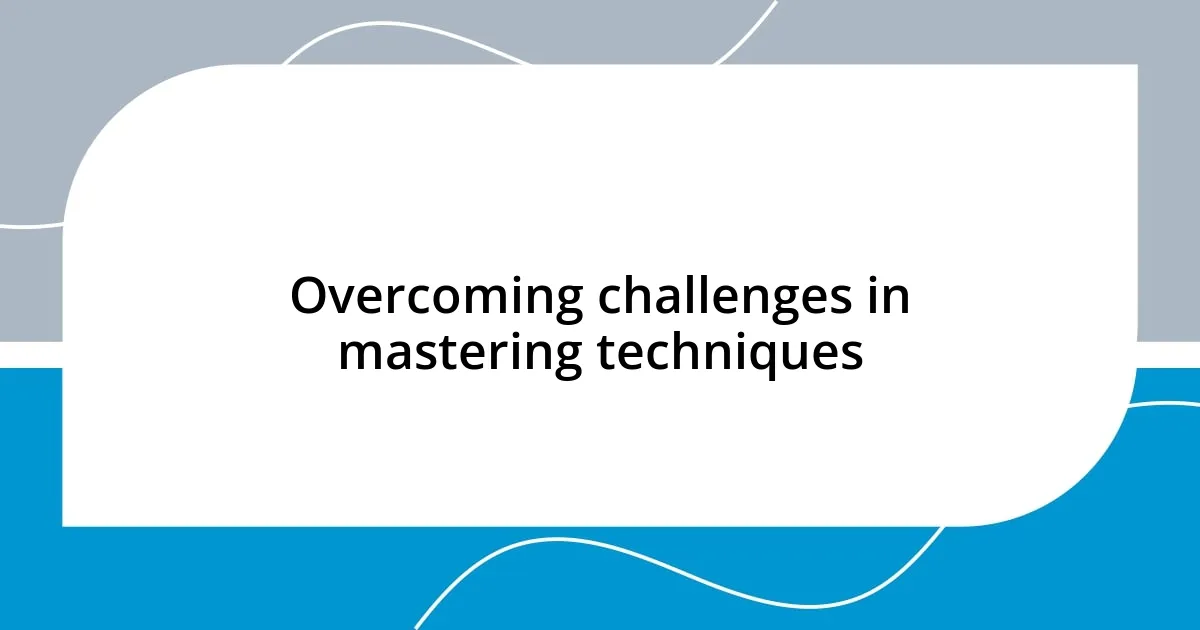
Overcoming challenges in mastering techniques
Mastering new techniques often comes with its share of hurdles. I remember when I tried to learn a complex new software tool; the initial confusion felt overwhelming. It led me to question my abilities and doubt whether I was cut out for this tech-savvy world. But instead of allowing self-doubt to consume me, I broke down the learning process into smaller, manageable parts. This approach not only made it less daunting but also reignited my excitement about learning.
One of the biggest challenges I faced was dealing with frustration. There were days when nothing seemed to click, and I felt like I was going backward instead of progressing. I often found myself asking, “Is this really worth the effort?” But every time I pushed through that frustration, I would eventually experience those delicious “aha” moments that made the struggle worthwhile. They often felt like small victories, reminding me that persistence always pays off.
It’s crucial to cultivate a support network during this journey. When I was wrestling with a particularly tricky technique, it was immensely helpful to lean on friends and colleagues who had more experience. Their perspectives and encouragement transformed moments of self-doubt into discussions filled with camaraderie and hope. Have you ever leaned on someone for guidance while mastering a new skill? That shared experience can create a sense of community, reminding us that we’re not alone in the learning process.
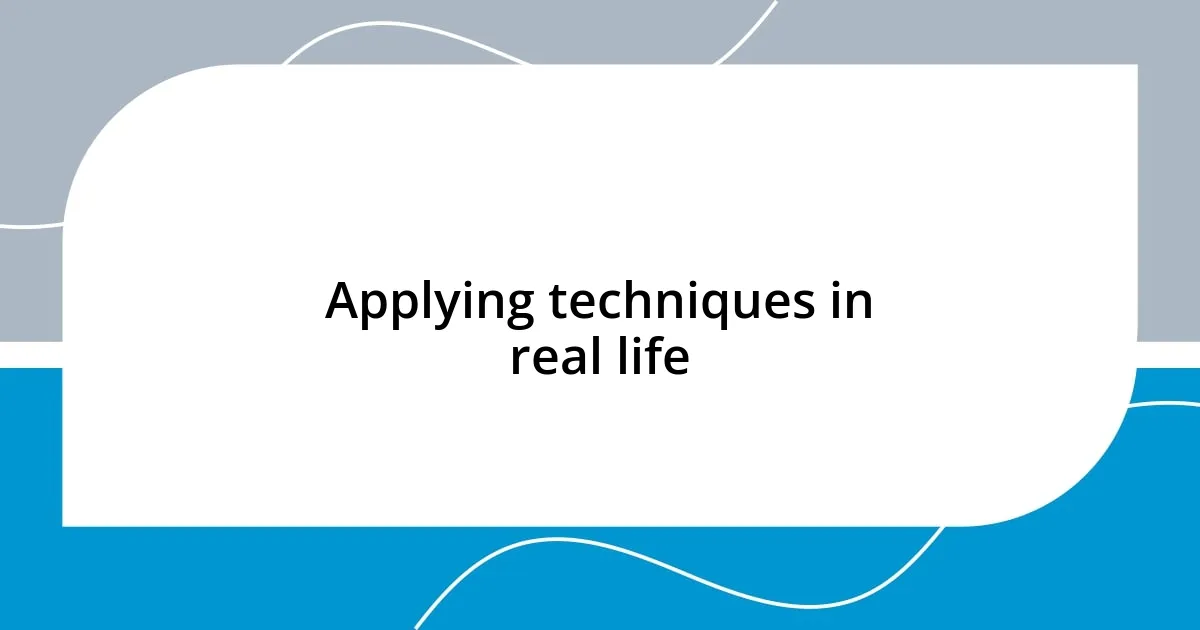
Applying techniques in real life
Applying techniques in real life often requires a willingness to experiment and adapt. I recall a time when I learned a new project management method that promised to streamline my workflow. Initially, it felt awkward integrating it into my daily tasks, but as I continued to practice, it became second nature. Isn’t it fascinating how something unfamiliar can evolve into a tool that simplifies your routine?
There’s also something incredibly satisfying about witnessing the impact of these techniques firsthand. I remember tracking the improvement in my team’s collaboration after implementing communication strategies I had learned. The difference was striking! My colleagues were not only engaging more effectively, but we also exceeded our project deadlines. It made me wonder—how often do we underestimate the power of simply changing the way we communicate?
However, real-life application isn’t without its hiccups. I’ve experienced moments where a technique that seemed promising didn’t yield the results I anticipated. I once tried adopting a time-management tool that I had read glowing reviews about, only to find it cumbersome and counterproductive. Those experiences taught me the value of patience and flexibility; sometimes, techniques need tweaking to truly fit your unique situation. Isn’t it reassuring to know that it’s perfectly okay to adjust your approach until it works for you?
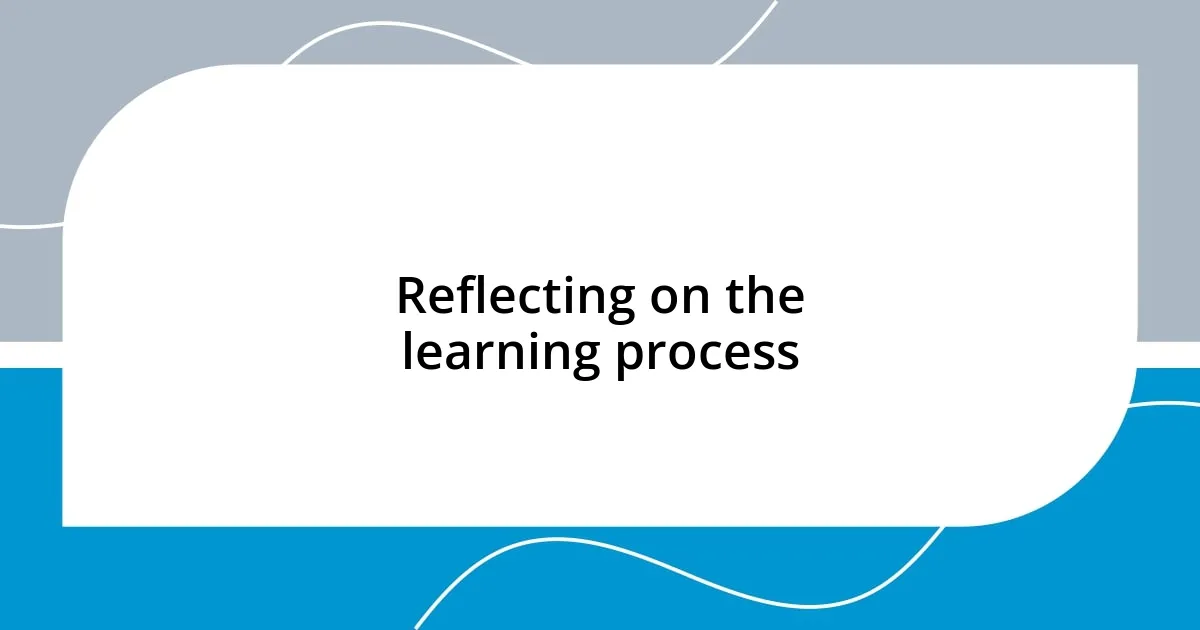
Reflecting on the learning process
Reflecting on the learning process reveals so much about our own capabilities. I remember sitting at my desk, engulfed in pages of notes, feeling that familiar mix of excitement and anxiety. I often asked myself, “Am I really grasping this?” Each time I thought I had it figured out, new concepts would surface, challenging my understanding. But it’s in this constant state of self-questioning that I found clarity and growth, proving to myself that discomfort can be a powerful teacher.
As I navigated through the complexities of new techniques, I would often take a step back and assess my progress. I distinctly recall nights spent reviewing my notes, feeling a sense of pride in my evolution. This reflection allowed me to celebrate small wins, like finally mastering a challenging software feature. Have you ever taken a moment to reflect on how far you’ve come? It’s those moments of recognition that fuel our motivation and inspire us to keep pushing forward.
I also learned the importance of patience in the learning journey. There were days when I felt like I was stuck in a loop, not making the progress I desired. On one particularly challenging day, I left my workspace feeling defeated. But as I returned the next day, I discovered that a fresh mindset often unlocks understanding. Isn’t it fascinating how a little break can bring new life to difficult concepts? This experience reinforced my belief that learning is a process, and sometimes, allowing yourself time to breathe can yield the best outcomes.



